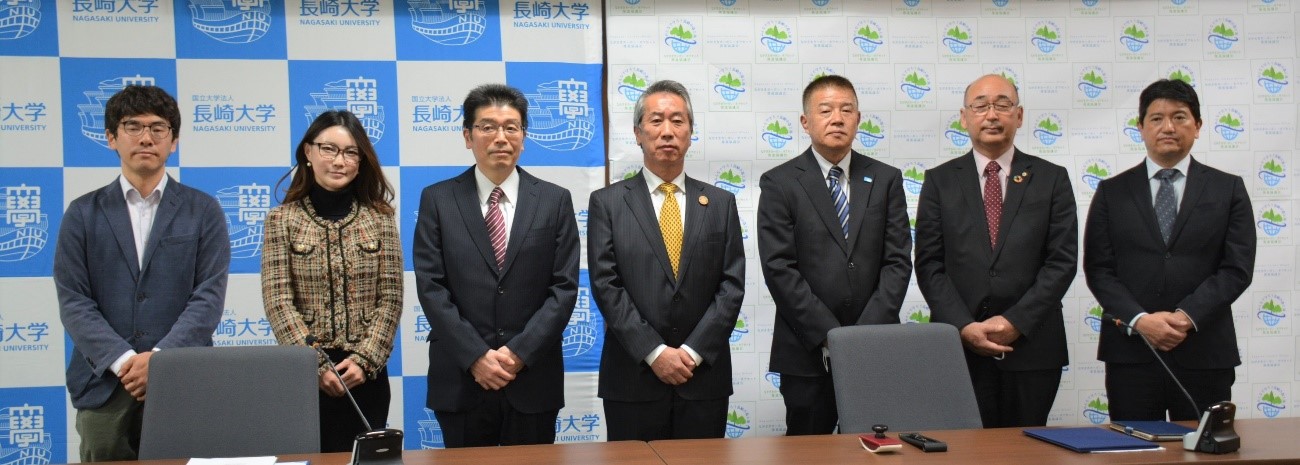January 17, 2022
Study on the impact of environmental and climate change policies using market mechanisms in the carbon-neutral era
Faculty of Environmental Science
Associate Professor Sunhee Suk
In order to realize the sustainable development goals (SDGs) and a green society, the international community and governments of each country have declared carbon neutrality, which achieves virtually zero greenhouse gas emissions, as a long-term goal of reducing greenhouse gases, and are devising policies aimed at achieving this. In particular, a green recovery strategy that combines and reinforces global warming countermeasures with efforts for economic recovery from the economic downturn caused by COVID-19 has become mainstream worldwide. Accordingly, around the world, climate change policies and related industries are proceeding with the aim of promoting such strategy. Expectations for the role of companies are rising during such a turning point, and companies' efforts to contribute to the environment, the SDGs and society are intensifying.
My research field focuses on policies based on market mechanisms aimed at solving environmental and climate change problems, and analysis of their impacts from various angles.
Specifically, the topics of study are (1) to understand carbon pricing, which is emerging as a key policy for climate change countermeasures, as well as clarify global trends in related policies, and (2) to analyze energy/climate change policies aimed at achieving the mid- to long-term greenhouse gas reduction goals of certain countries (mainly Japan, China, and Korea in Northeast Asia), and the impact of such goals on economies and the environment. The linkage of carbon markets in these three countries has recently become a focus of research. My research includes (3) empirical-based approaches that make use of company-level data and surveys identifying corporate views on carbon pricing policies, as well as environmental and carbon management status/trend and determinants in response to carbon pricing and the carbon market. A case study of each research component is described below.
|
Figure 1 Conceptual diagram of the research field |
(1) Research on carbon pricing history, background and design analysis
Carbon pricing (CP) is a global warming countermeasure mechanism that attaches a price to CO2 emissions, such as through taxation, emissions trading or voluntary credit systems. CP is a cost-effective way to reduce carbon emissions and realizes policy effects such as promotion of development and dissemination of decarbonization technology. As of November 2020, CP had been introduced in 46 countries and 35 regions, including the EU.
Japan, China and South Korea, the major economies of East Asia, which account for about 35% of the world's greenhouse gases, have introduced carbon taxes, emissions trading, and other measures which together play an important role in achieving net zero. Japan introduced regional CP (similar to the emissions trading system, or ETS), termed Cap and Trade in the two prefectures of Tokyo (2010) and Saitama (2011). China initiated seven pilot carbon markets in two of its provinces and five cities (Guangdong, Hubei, Beijing, Tianjin, Shanghai, Chongqing and Shenzhen) in 2011 and instigated nationwide ETS from 2021. South Korea introduced its first national-level ETS in the region in 2015, and the third phase thereof is currently operating in five sectors (Power, industry, public / waste, building, transportation).
My lab studies the history, background of introduction, and design of schemes for carbon pricing policies in these countries, and compares and analyzes the characteristics of each.
|
Figure 2 Carbon pricing policies |
[Related papers]
昔宣希(2020)韓国温室効果ガス排出量取引制度の第 1 期及び 2 期の運営動向、ディスカッションペーパー (20) 、京都大学大学院 経済学研究科 再生可能エネルギー経済学講座、2020年8月 (https://www.econ.kyoto-u.ac.jp/renewable_energy/stage2/contents/dp020.html)
Sunhee Suk (2015) Greenhouse Gases Emissions Trading and Carbon Tax Scheme in the Republic of Korea. Eds. Matsumoto K., Gao, A.M, Economic Instruments to Combat Climate Change in Asian Countries. Chapter 3, Wolters Kluwer
(2) Research on the medium- to long-term economic and environmental impacts of climate change policies toward carbon neutrality
This study analyzes the impact of climate change policy on the medium- to long-term macroeconomy using a macro model in the form of joint research with domestic and foreign researchers. As specific research contents, some of the recent research results are shown in Figure 3 below (Quantitative analysis of carbon prices needed to achieve Japan's greenhouse gas reduction targets for 2030 and 2050) and Figure 4 (Energy composition for the realization of carbon neutrality in 2050 and its impact on the macro economy).
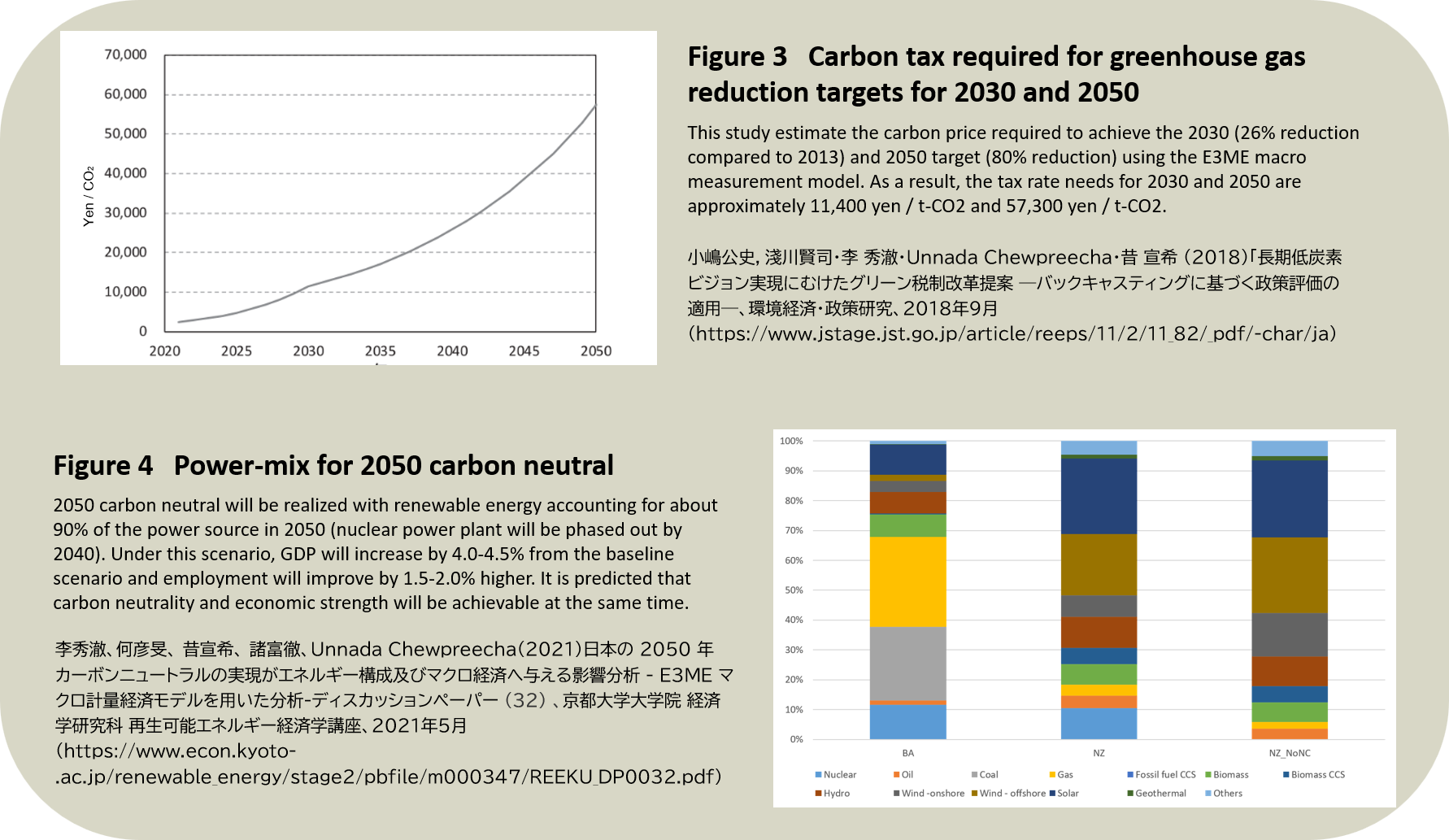 |
My present research, “Analysis of the impact of carbon market collaboration between Japan, China, and South Korea on the macroeconomy”, is based on the Nagasaki University Global Collaboration Supporting Fund.
The scale of the carbon market in Japan, China and South Korea is the largest in the world, and market expandability (cooperation between Japan, China and South Korea, possibility of ties with ASEAN and EU) is anticipated in the future. Therefore, as shown in Fig. 5, as an initiative toward achieving carbon neutrality in the region, my research aims to elicit what the challenges are to creating carbon markets in collaboration with each country, and what the benefits might be for each country, and includes the use of modelling.
|
|
(3) Research on the current status and trends of corporate carbon management and corporate perspectives on carbon pricing
The intensifying pace of climate change, along with related crises, has led to stronger government policies and heightened consumer awareness of the issue, which requires businesses to decarbonize their entire operations. The present context, therefore, could be seen as a transition period in which companies have the opportunity to turn a crisis into an opportunity and advance their carbon management from its current, or conventional form, i.e., environmental management (mainly pollution management and compliance) by adopting more strategic and longer-term visions, implementing more effective practices, and further contributing to society and value. Examples of corporate carbon practices based on empirical study are shown in Figure 6.
This study analyzes the status and range of the corporate response to climate change and determinants through an empirical survey of companies. Further, by evaluating policies, obstacles, and required support measures from a company's point of view, it fills the gap between government policy and corporate response through highlighting the related implications for businesses as well as aspects for consideration in terms of advancing governmental policy and corporate decarbonization management.
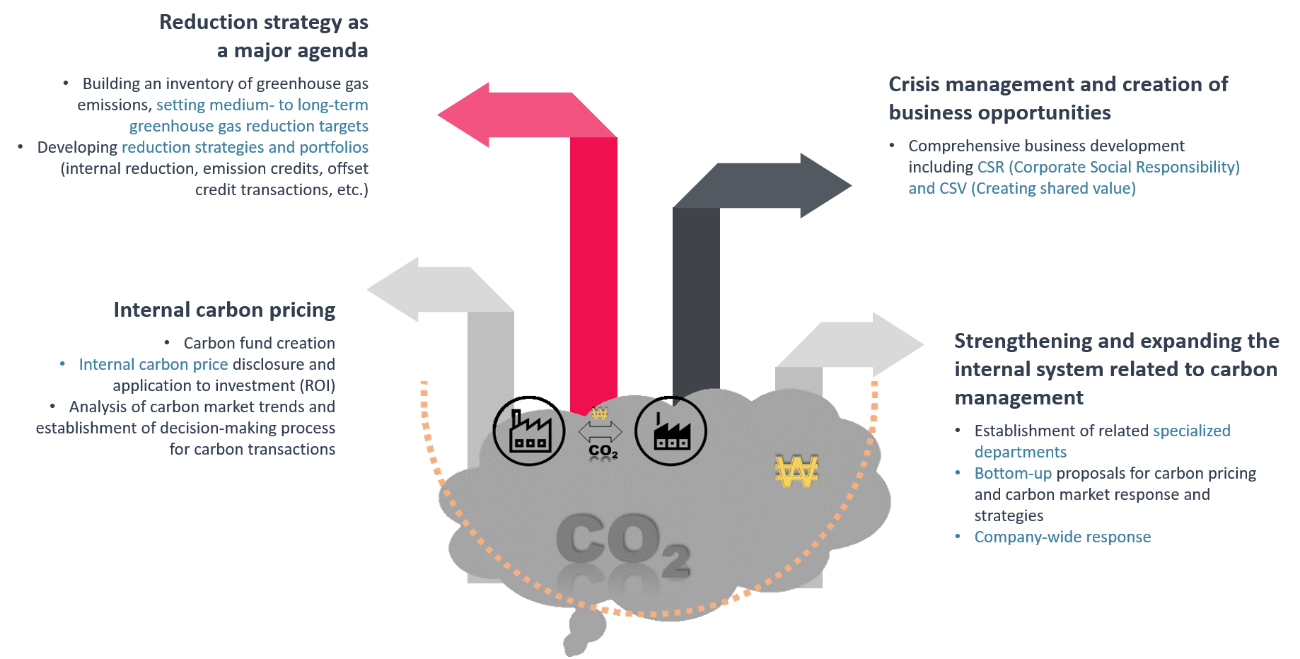 Figure 6 Examples of carbon management in companies Figure 6 Examples of carbon management in companies |
As part of this study, in my capacity as a guest lecturer*1, lectures on corporate decarbonization management were held for small and medium-sized entrepreneurs in Nagasaki Prefecture. Related actions have included signing an agreement with industry-related organizations in the prefecture (see the photo below), and joint research on decarbonization management using carbon offset credits derived from local natural resources (for example, forests), which Nagasaki prefecture is currently promoting. This study is anticipated to derive useful recommendations for locally-based businesses and government entities on action plans for climate change and the Sustainable Development Goals (SDGs). It is also expected to contribute to the realization of Nagasaki University’s “Planetary Health” vision.
|
Photo Source: Nagasaki University News (December 23, 2021) “The Faculty of Environmental Science has signed an agreement with the Nagasaki Carbon Offset Promotion Council” |
[Related papers]
――――――――――――――――――
*1 Nagasaki University News (December 27, 2021) “Giving a lecture on corporate carbon management for small and medium-sized entrepreneurs in Nagasaki Prefecture” (https://www.nagasaki-u.ac.jp/ja/news/news3517.html)
Sunhee Suk (2021) South Korea’s Emission Trading Scheme and Company Carbon Management in The First Phase (2015-2017), Research Project on Renewable Energy Economics, DP NO.34 (2021, June) (https://researchmap.jp/suksunhee/published_papers/32729458)
Sunhee Suk (2018) Determinants and Characteristics of Korean Companies’ Carbon Management under the Carbon Pricing Scheme, energies, 11(4), pp. 966
Sunhee Suk, Sang-youp Lee, Yushim Jeong (2018) The Korean Emissions Trading Scheme: Business perspectives on the operations. Climate Policy, 18(6), pp. 715–728
Summary
What was previously considered climate change has now come to mean climate crisis or climate emergency, and what we are increasingly witnessing is that what this translates as, on a fundamental level, is the critical issue of survival from environmental degradation. Nagasaki University provides an excellent setting in which to study environment-related phenomena from a scientific point of view, such as the current state of society and the challenges ahead, as well as discuss possible paths through the various crises facing us. In this context, focusing on a financially economical method (carbon pricing) towards realising reductions in greenhouse gases more cost-effectively, my lab reviews the design of carbon pricing schemes based on the various ideologies of the countries concerned, conducts model analysis for the mid- and long-term impacts of climate change policies, and empirically studies corporate perspectives and responses to market-based instruments. The related study activities are carried out in cooperation with domestic and foreign researchers as well as locally-relevant entities such as local businesses. These studies aim to deliver policy implications and recommendations as well as contribute to more efficient and effective implementation of climate change policies. For more reference materials related to this research, please see the URL below.
URL: https://researchmap.jp/suksunhee











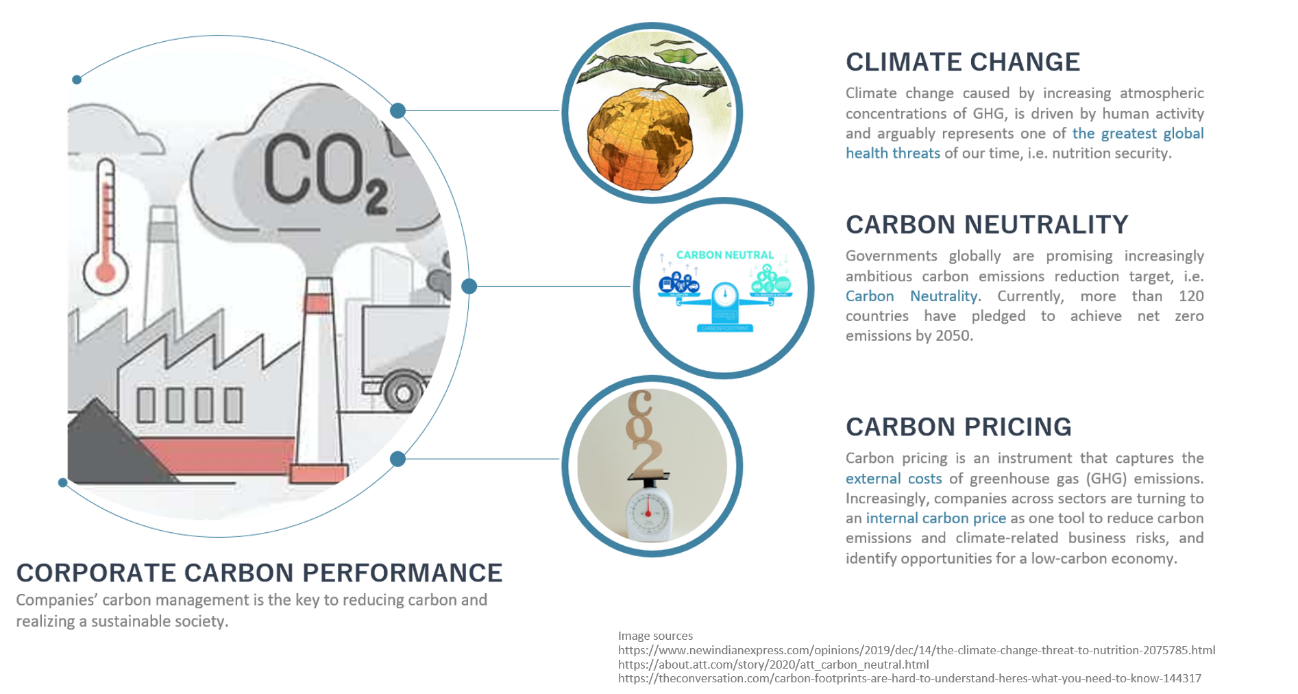
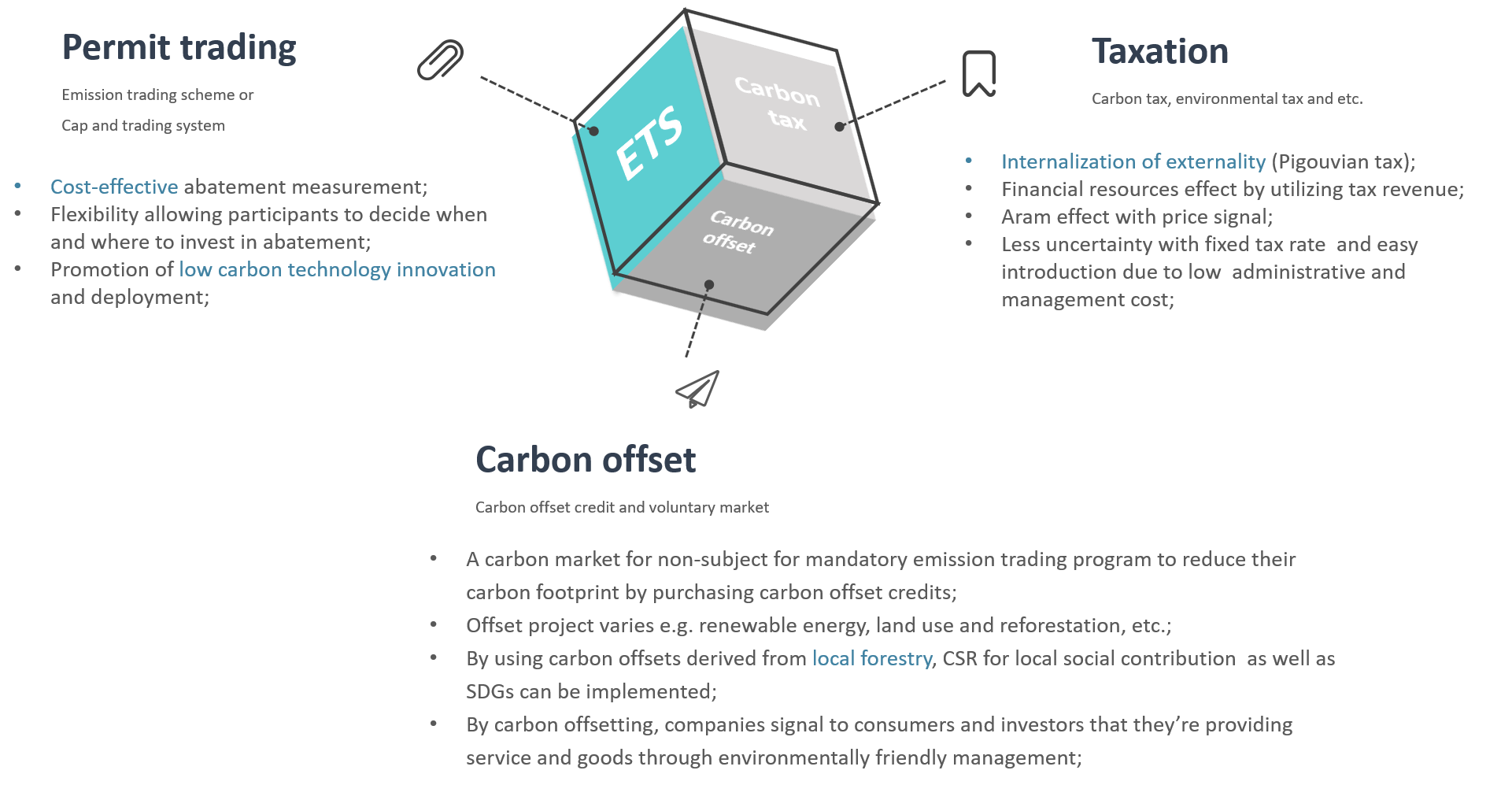
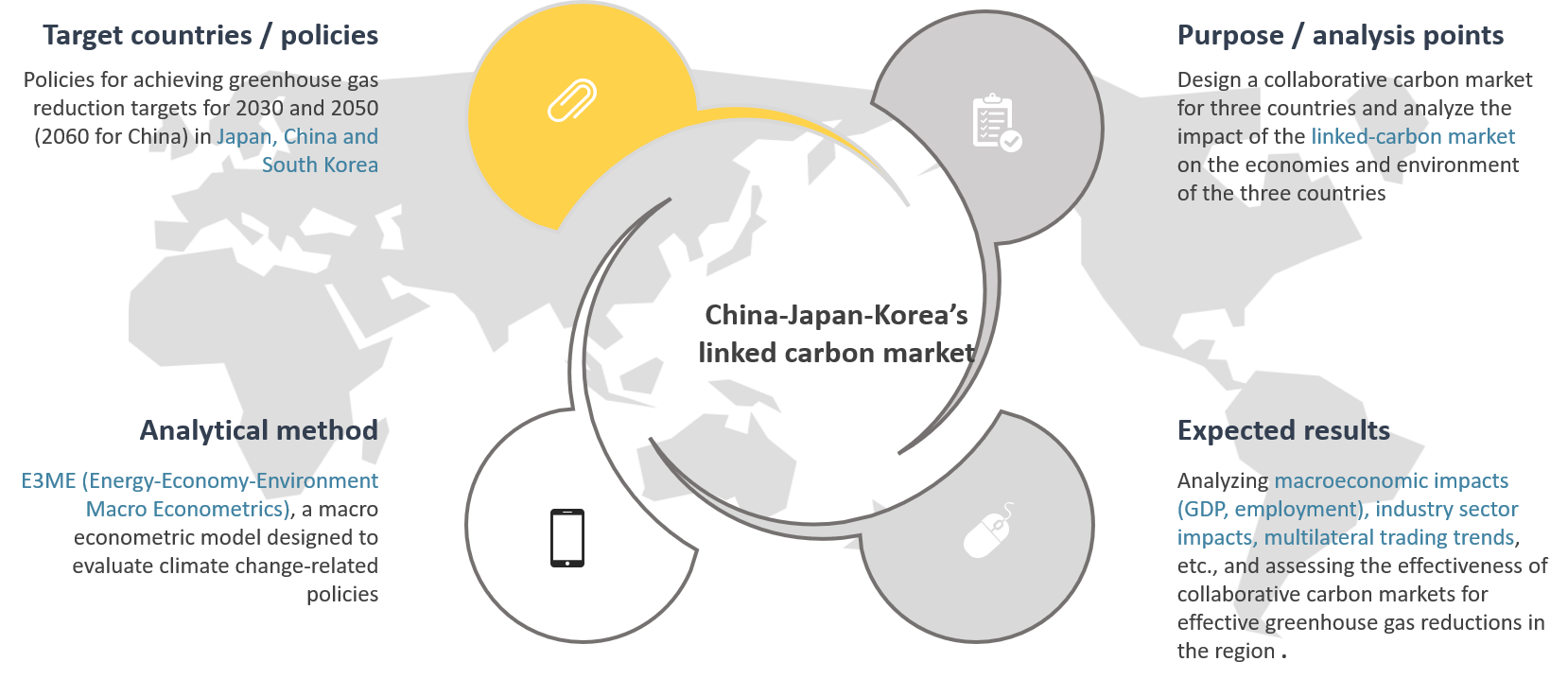 Figure 5 Outline of research on carbon market cooperation between Japan, China and South Korea
Figure 5 Outline of research on carbon market cooperation between Japan, China and South Korea